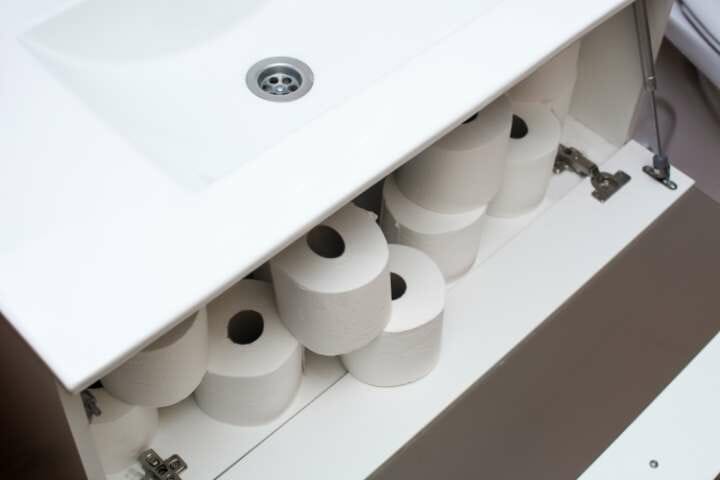If your loved one has been diagnosed with dementia recently you may have noticed that they have an obsession with toilet paper. This can be difficult to understand and a little frustrating for family members to understand.

When this happens you may feel as though you’re just going through toilet paper, and wasting it away however there is a reason why it happens and it’s related to the dementia.
Alzheimer’s Fixations
Many Alzheimer’s patients, and dementia patients too, can become completely fixated on certain thoughts, actions or objects. Most of the time, these thoughts and actions don’t cause any harm to themselves or to anyone else so really there’s no need to redirect these behaviors at that time.
However, sometimes they can be dangerous to the person with dementia or put them at risk for getting hurt. If this is the case, then it’s imperative you intervene and make sure they are not going to get hurt or hurt another person.
You might like to read: 40 Inspirational Uplifting Dementia Quotes
Dementia and tearing things up
You may find that someone you know with dementia has an obsession with tearing things up: tissues, paper, toilet paper – whatever it may be.
There are a few reasons why it could be happening. The first is that it could be a response to a physical condition. Things like urinary tract infections are very common for people who have dementia so tearing up items and fixating on them could be a symptom of that.
If you have determined that there isn’t a physical cause to why your loved one is exhibiting these behaviors then next it’s time to look at mental reasons.
Tearing things up could be a way for someone to relieve some of the tension they are feeling. Most often, people with dementia feel very confused about why they are in a certain place or all of the people they are with.
This activity can help them to cope with any anxiety or nerves they are feeling as well. In fact, some studies done on people living with dementia have found that activities like tearing up toilet paper can have the same calming effect as taking a hot bath.
Another reason this could be happening is boredom. For those living with dementia, they may often feel as though they don’t know why they are in a certain location or who they are with and why. For this reason they may feel bored or like they aren’t quite sure what to do with themselves.
So they begin to tear at paper or tissues, or whatever they can find, to just pass the time.
Some family members may find that their loved one will begin to hoard the items that they enjoy tearing up. They may take whole boxes of tissues or rolls of toilet paper into the room and hide them so that they are able to continue this compulsive behavior without anyone interfering.

You might like to read: Why Do Dementia Patients Go to the Bathroom So Much?
How to stop it from happening
Sometimes it can be difficult to stop the compulsive behavior from happening because your loved one will sneak away from you to do it or try to hide it if they think it’s something you are not going to like.
In an effort to help stop your loved one from doing this compulsive behavior you can try to keep them busy and occupied.
Keeping them engaged socially, mentally and physically will give your loved one something to do and they will feel like they are part of something. They won’t be left alone and unsure of why they are in a certain place, either.
Providing activities for them to engage in can help them feel like they have a purpose and something to do. This is very important because many people living with dementia have a level of confusion, and they really don’t know what to do with themselves or feel like they aren’t sure where they should go.
Creating a rummage box
For some people living with dementia having a rummage box has proven to be very helpful for reducing the amount of tearing they do and won’t be removing whole boxes of tissues anymore.
A rummage box can be filled with old phones, broken model cars and other toys. Some people have left a note about repairing things that are found in the box so that those with dementia feel as though they have a project to work on and know what they are supposed to do.
Having a rummage box keeps the person with dementia occupied but it also keeps them safe from harming themselves or others.
In some rummage boxes people will put old pieces of paper with pens so that people with dementia can scribble away as they want to.
If you know that your loved one has a specific interest or there’s something they really like to do – like figuring out puzzles – then you can customize the rummage box to give them items that you know they will enjoy using.
Redirection efforts
In some cases, redirecting your loved one to a rummage box or any activity may not be enough to stop them from tearing up paper or tissues. So now it’s time to try something else.
You might like to read: When Do Dementia Patients Need 24 Hour Care
Conversational redirection
If you know that your loved one has travelled a lot or they had a certain hobby when they were younger, you can ask them questions about it. The questions don’t have to be specific or pointed, but general questions about that topic may trigger memories for them or a happy time for them.
One question may be enough to open up a whole conversation for them and they will be distracted enough to not be tearing up the toilet paper and tissues.
When conversational redirection is not enough
Sometimes your loved one will not be able to communicate with you, or it could be a rough day for them so trying to talk to them isn’t going to be enough for them to stop the damaging behavior.

If that’s the case, here are some tips for helping them stop tearing things up
- Do not tell them to stop doing what they’re doing or try to logically reason as to why what they are doing is damaging
- Do not ask them “yes” or “no” questions because you probably won’t get a real response out of them. Instead, saying things like “Let’s go for a walk” or “Let’s go make a cup of tea in the kitchen” will probably get a much more positive response than “yes” or “no” questions will.
- Try to understand your loved one’s background or history because this will make it easier to point them in the direction of something that will make them happy and will distract from damaging behavior.
You might like to read: How To Find a Care Home for an Aggressive Dementia Patient
As a caregiver, if your loved one is engaging in damaging behavior and it’s hard to distract them from it then you need to take control of the situation and redirect them to something that is safe.
It’s going to be frustrating because your loved one can’t communicate as clearly with you as to why it is they’re doing what they’re doing, and they don’t really understand it either.
It’s important to remember that if you are angry, anxious or stressed out your loved one will feel it and they will feed off of it. They may not know exactly who you are but they may still feel like they know you and trust you, so if you’re nervous then they will feel like they need to as well. So try to make sure you stay calm, even if you’re very frustrated, when trying to redirect them.

Short, calm conversations
As mentioned, trying to calmly reason with your loved one or explain to them why they can’t do something is probably not going to go over very well and they will not simply understand it and then stop their actions.
Do your best to keep your side of the conversation short and to the point so that your loved one doesn’t have to try and follow along.
You might like to read: Dementia – The Complete Guide for Seniors and Caregivers
If it’s not really causing them harm
If your loved one’s fixation on tearing up toilet paper, or tissue, isn’t hurting them or anyone else than you don’t necessarily have to stop them from doing it.
Yes it can get frustrating and you will have to clean up after them, but tearing up toilet paper is really not hurting themselves or others.
Being a caregiver is a difficult task, so focusing on developing a positive relationship and providing the right kind of care is the most important part.
It’ll take some trial and error to make sure you find the right rhythm and routine for providing care for your loved one but with some patience you will get there and they will likely get to a place where they trust you more, and it might get easier to stop their fixation behavior.
If you have concerns about your loved one’s behavior or think that they could be something else wrong, it’s important to make an appointment with their doctor to address your concerns. If there’s an underlying medical issue then getting it fixed as soon as possible is crucial.
